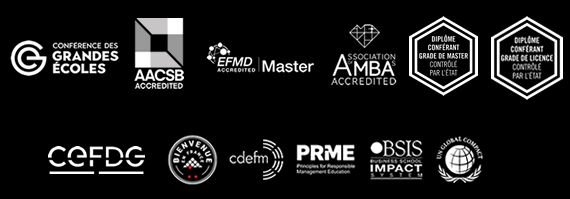The World Economic Forum’s 2025 report highlights major transformations in the job market linked to technological transition, generative AI and climate issues. For higher education, these developments are reshaping the skills expected and the organisation of careers.
For Business Schools, these findings are not just an observation: they shape the way in which skills needs are anticipated and training programmes are adapted.
Changing professions: growth and decline
According to the World Economic Forum report, nearly 23% of current jobs will change significantly in the coming years, equivalent to 83 million new jobs and 97 million net job losses worldwide.
The most dynamic professions are in the fields of cybersecurity, data, AI and sustainable transition: data analysts, cybersecurity specialists, AI engineers, sustainability managers and customer experience specialists.
Conversely, administrative, data entry and office support roles are expected to see the sharpest declines. For future managers, this polarisation highlights the need to acquire dual skills: understanding technical fundamentals and mastering business implementation.
EMLV’s Master in Management – Grande Ecole Programme integrates hybrid management, digital and engineering from the first cycle onwards, through cross-disciplinary projects with De Vinci Higher Education schools. This approach promotes interdisciplinary collaboration and the practical application of a variety of skills to address concrete challenges.
Priority skills: the shift towards soft and technical skills
The report highlights four skill sets considered critical by employers:
- Data analysis and interpretation: central to finance, marketing and supply chain roles.
- Critical thinking and complex problem solving: required in consulting, auditing and strategy.
- Creativity and innovation: essential in marketing, communication and customer experience.
- Resilience, collaboration and social intelligence: required in all leadership roles.
At EMLV, these dimensions are reflected in a structured soft skills programme covering communication, ethics, creativity and stress management, as well as student engagement through sports, international activities, community life and solidarity initiatives. This practical approach meets the needs of recruiters, who struggle to measure the real impact of soft skills training.
AI and cybersecurity: two converging strategic priorities
The World Economic Forum identifies generative AI and cybersecurity as two major drivers of transformation. On the one hand, AI is redefining value creation, from the automation of financial tasks to marketing personalisation. On the other hand, the rise of cyber threats requires every function to understand digital risk management.
All major areas of activity are affected by these developments:
- In finance, the use of AI agents for automated portfolio analysis and the integration of cybersecurity audits into practical cases.
- In marketing, generative AI for cross-channel campaigns and cyber risk management in omnichannel environments.
- In HR, AI co-pilots for recruitment and GDPR compliance for employee data management.
- In supply chain, predictive planning via AI and supplier security.
These orientations are consolidated by cross-functional AI/cyber hackathons conducted with ESILV and IIM, which expose students to realistic crises and the co-construction of solutions.
The international and societal dimension
The report also emphasises the need to integrate the green transition and the intercultural dimension into future careers. Companies are looking for candidates who are able to work in multicultural environments and lead projects with a sustainable impact.
EMLV reinforces this dimension with a 100% international third year, combining an academic semester and an internship, prepared by intercultural communication workshops and followed by a collective debriefing upon return.
At the same time, the solidarity mission structured in the second year and the annual societal hackathons (ethical AI, inclusion, climate) offer concrete experience of the social impact expected of future managers.
A training model aligned with global trends
The World Economic Forum study shows that graduates will need to combine technological mastery, human intelligence and a sense of societal impact.
This is precisely the positioning of EMLV’s Master in Management programme: a five-year post-baccalaureate course that combines management and technology, international immersion and comprehensive personal development (soft skills and compulsory sports). The aim is to train hybrid and responsible managers who are prepared to lead major economic, digital and societal transitions.
Working practices in 2030: a discussion already in progress with the NEXT Chair
The NEXT Chair – New Work Experiences, co-led by EMLV and Obea consultancy, is conducting a forward-looking investigation into how working practices will evolve by 2030. Based on a hackathon involving more than 1,300 students and a survey of around 50 HR directors, the initial findings highlight two striking trends: hybrid working arrangements (a mix of remote and on-site working) and greater flexibility in terms of time, location, contracts and job content.
This research also identifies the priority expectations of future workers: lifelong learning, work-life balance and consideration of societal and environmental issues. At the same time, it warns of the risks associated with changing practices: over-connection, information overload and employee isolation.
These findings enrich the educational approach of the Grande Ecole Programme, which aims to prepare students to navigate an environment marked by uncertainty, flexibility and new aspirations. They naturally tie in with initiatives such as the De Vinci Augmented Skills Passport, inter-school hackathons and the solidarity mission.






















